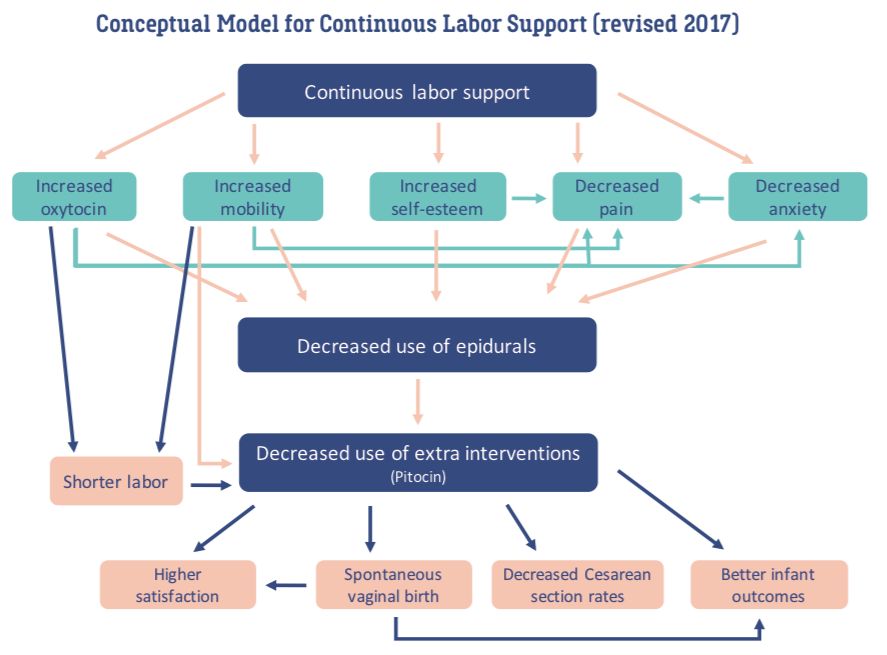Every woman deserves a Doula.
She is not a friend. She is not a healthcare provider. She is a mother figure of an ancient kind. Her life experience empowers you. She is a reassuring presence who will always listen to you and support you in your chosen path. She will remind you of those choices, and the reason you made them, when you doubt, are anxious or afraid. She sees you; the real you. Her understanding of your journey supports your self-confidence. She eases pain with a touch, a word, a look. She is a Doula and she is there to help.
What is a Birth Doula?
A Birth Doula is an evidence based expert who is trained to provide continuous support on the emotional, mental and physical aspects of birth.
In labor, you need expert care both medically but also for comfort, emotional and mental wellbeing and for physical support. Many women and their partners expect to enter their birth experience with all the support they need coming from nurses and providers. Given the demands on these medical professionals, they cannot provide contraction-to-contraction support. That is where a Birth Doula comes in.
What do birth doulas offer?
Physical Support
Position for comfort and labor progression cross over with hands-on comfort measures like comforting touch, counter pressure, breathing techniques and coping techniques.
Emotional Support
Doulas help families to feel supported, easing the emotional experience of birth and also helping to create a space where the hormones of labor can work at their best. Whether a birth is completely unmedicated or medically very complex, every family can benefit from nurturing and connection at this tender, incredible time in their lives.
Partner Support
Whether it’s a romantic partner, a friend or another family member like the baby’s grandma, the birth partner’s experience matters in birth. Doulas are there to support every birth partner in being as involved as they’d like with the birth. Physical and emotional support make a huge difference for everyone involved.
Evidence-Based Information and Advocacy
Doulas are trained to help families connect with evidence-based resources so they can ask great questions and make informed decisions about their births. Doulas serve as a bridge of communication, lifting women up to help them find their voices and advocate for the very best care.
What is NOT included in doula support?
Doulas are not medical professionals, and the following tasks are not performed by doulas:
They do not perform clinical tasks such as vaginal exams or fetal heart monitoring
They do not give medical advice or diagnoses
They do not make decisions for the client (medical or otherwise)
They do not pressure the birthing person into certain choices just because that’s what they prefer
They do not take over the role of the partner
They do not catch the baby
They do not change shifts (although some doulas may call in their back-up after 12-24 hours)
Doula
FAQs
-
Training is up to the discretion of the Doula as there is no regulation or limitation placed on how one becomes a Doula. There are several training institutions and certification programs for Doulas, of which the most rigorous is DONA.
DONA Doulas like Ariel have to undergo significant training and education in order to become certified as a Doula. This training included hands-on Birth Doula workshops, Childbirth Classes, Breastfeeding classes, supervised births, lots of reading and mentorship from experienced Doulas.
More info about how to become a doula with DONA can be found here.
-
Some—but not all—insurance companies will cover all or part of the cost of a doula. Check with your insurance company to find out. There may be a volunteer doula program in your area for women who can't afford to hire one.
-
Supportive partners are so incredibly wonderful to have with you in the birth room as they know you best. Having a doula only complements a supportive partner as she carries with her a strong knowledge of everything to expect in labor - both good and bad. She also is objective and experienced, giving a Doula the strength to respond to the changing circumstances of birth with ease and perspective.
Doulas are familiar with birth and can help you get the information you need to make the decisions you face while understanding how they may impact your labor. Doulas can guide labor practices towards a mother’s instincts in a calm and knowledgeable manner.
Having a Doula only adds to the birth team as a Doula’s primary focus is to help the mother have the best birth experience possible, no matter her labor and birth outcome. She is there to amplify the support, not take away from it.
Do Birth Doulas Make A Difference?
A 2017 systematic Cochrane review showed that having continuous labor support from a Birth Doula makes one MORE likely to have a spontaneous vaginal birth and shorter labor, and LESS likely to have:
A cesarean delivery
An instrument assisted delivery
A negative birth experience
Regional pain medication
Low 5-minute APGAR scores
Research also shows that when continuous labor support is provided by a doula, women experience an:
Increased rates of exclusive breastfeeding
Decrease in the use of Pitocin
Decrease need for pain medication
Decrease in incidence and severity of postpartum depression


